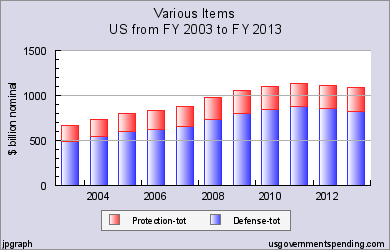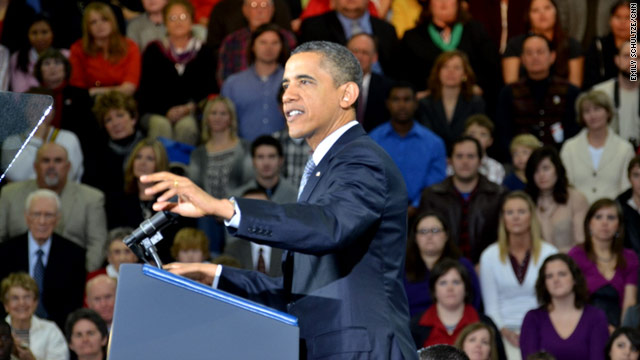Middle Class
Yesterday, President Barack Obama spoke to the “Middle Class”
at Osawatomie High
School in Osawatomie,
Kansas. We know he was speaking
to the “Middle Class” because he used the phrase “Middle Class” a total of
twenty-six times.
Obama told us who the Middle Class were; they were the
teacher, the nurse or the construction worker earning maybe $50,000 a year. He
told us that they were people who have a college degree, that unemployment for
people with college degrees is about half the national average and income is
twice as high as those who don’t have a high school diploma.
But what is the “middle”? In statistical jargon,
there are four key measures for any population of data points; mean, median,
mode and range. The middle value of any population is the median. The
value that appears most often is the mode and the average of all values is the
mean. Range is the difference between the highest value and the lowest value in
the populations.
Middle Income
The median American household income in 2012 was $51,371.
That must be the middle Obama was speaking about when he told us that “a
teacher or a nurse or a construction worker, maybe earns $50,000 a year”.
"There are three kinds of lies: lies, damned lies, and
statistics."
~Mark Twain
But “household income” is NOT synonymous with individual
wages. The measure of household income tells us nothing of how many people
worked, how many hours they worked or whether the income was derived from their
work or from other sources such as pensions and annuities, business income,
rent, interest or other capital gains.
According to the Social Security Administrate the average
compensation (wages, tips and the like) for 2012 was $42,498.21 but the median
compensation was estimated to be just $27,519.10.
What this means is that
half of the people who worked and earned money in 2012
were compensated with less than $27,519.10. We still do not know how many hours they
worked or what their hourly rate was, but we do know that they did NOT earn
“maybe $50,000 per year”.
The Surest Route to
the Middle Class
“In
this economy, a higher education is the surest route to the Middle Class. The
unemployment rate for Americans with a college degree or more is about half the
national average. And their incomes are twice as high as those who don’t have a
high school diploma.”
Education -
Unemployment
To understand this statement, the words have to be
un-wrapped and the rhetoric exposed. The national average unemployment rate of
those 25 years of age and older is 5.8% and the unemployment rate for those
with a Bachelor’s degree and higher is 3.7%.
But this too is misleading because the number is
artificially reduced by the inclusion of those with advanced degrees who are
the least likely to be unemployed.
In 2010, people with a Bachelor’s degree made up 19.4% of the total
population, 23.2% of the employed population and 13.5% of the unemployed
population. People with advanced degrees made up 10.5% of the total population,
13.0% of the employed population and just 4.8% of the unemployed population.
Weighted for percent of population, the unemployment rate
for those with an advanced degree is roughly 2.8% and for those with a
Bachelor’s degree is 4.2% or nearly three fourths the national average … NOT
even close to half.
Is an Associate’s degree a “college education”? In 2010, people with an
Associate’s degree (including vocational degrees) made up 9.1% of the total
population, 10.5% of the employed population and 18.2% of the unemployed population.
The unemployment rate for those with an Associate’s degree
is 5.2%, roughly the same as the national average.
But other factors remain to be considered, such as age.
Unemployment is especially high among those who are 25-34 years of age; 42.4%
of the people in that age range are college graduates and the unemployment rate
is 7.2%.
The question then becomes not just what percent are
unemployed but what do they earn when they are employed.
Education – Wages
Excluding those with advanced degrees, in 2009 a person age
25 to 34 years old with a Bachelor’s degree earned an average of $45,692 and
with an Associate’s degree earned $35,544. The same age person with some
college but no degree earned $31,392 and a high school graduate earned $27,511.
Those who were not a high school graduate in the same age range earned $19,415.
The president’s choice of words was very careful indeed. While
42.4% of people in this age range have a college degree, only 11.6% did not
graduate from high school. High school graduates and those with some college
but no degree make up the largest part of the population at 46.1%.
The truth is that a person in this age range with a
Bachelor’s degree only earns, on average, 45% more than a person with any
education whatsoever beyond high school. Most of their added income is consumed
by the necessity of repaying loans or by higher tax rates.
And remember, these are means or averages, not medians or
modes. If income distribution curves tell us anything it is this, the median is
always lower than the mean and the mode is always lower than the median. In
other words, half of the college graduates will earn significantly less than
the mean and a college graduate is far more likely to earn dramatically less
than the mean.
Education,
Unemployment and Wages
Unemployment is NOT the result of having too few educated
people. In fact unemployment is also high among educated people. When President
Bill Clinton finished his term of office in 2000, the unemployment rate for
those age 25 years and over with a Bachelor’s degree and higher was just 1.7%
compared to the current rate of 3.7%. Even those with a high school diploma and
no college had a lower unemployment rate of just 3.4%.
In the year 2000, 65.3% of the population had jobs and today
only 61.1% have jobs. In the year 2000 just 24.4% of the population had a
Bachelor’s degree and higher
,
today that number has risen 29.9%. The population of college educated people
has risen 5.5% but the employment ratio has dropped 4.2%.
Note: The employment ratio remained well below 61.1% from 1948 until 1985.
The ratio was commonly 56-59% from 1948 until 1978. Current employment ratios
represent a correction toward historic levels of employment except that modern
employees are underpaid.
Did educating a higher percent of the population reduce the
employment ratio? Of course not! Educating people creates a ready supply of
qualified labor, but it does not create jobs.
What about wages? President Obama told us about well
established public sector teachers with a college education, experienced
college educated nurses and skilled construction workers with union jobs
earning $50,000 per year. But new entrants in these vocations are not fairing
as well in spite of the larger number of college educated people.
Most of the new jobs are in retail, food service and
hospitality. Are the people stocking shelves at the grocery story, serving food
in restaurants, and making beds at hotels earning more because they have
college degrees? Not a chance!
Roughly half of college graduates who have work say that their college
degree was not required. This is especially true of those earning lower
incomes. 38% of college graduates found white collar jobs and 49% of them said
that a college degree was not required. 18% of college graduates found blue
collar jobs and 81% of them said that a college degree was not required.
With the exception of postgraduates and professionals or
executives, the majority of college graduates indicate that a college degree is
not required for their job.
Wages and Hours - A
Fair Shot and a Fair Share
Some people thought that President Obama was talking about the
“minimum wage”, but he wasn’t; he only used the phrase “minimum wage” once in
reference to President Theodore Roosevelt’s vision for wages, work hours and
education. Roosevelt called his vision “New Nationalism” and introduced it at a
speech given in Osawatomie,
Kansas on August 31, 1910.
“No
man can be a good citizen unless he has a wage more than sufficient to cover
the bare cost of living, and hours of labor short enough so that after his
day's work is done he will have time and energy to bear his share in the
management of the community, to help in carrying the general load. We keep
countless men from being good citizens by the conditions of life with which we
surround them. We need comprehensive workmen's compensation acts, both State
and national laws to regulate child labor and work for women, and, especially,
we need in our common schools not merely education in booklearning, but also
practical training for daily life and work.”
President Obama said, “I
believe that this country succeeds when everyone gets a fair shot, when
everyone does their fair share, when everyone plays by the same rules.” But
what is this “fair share”?
The average work week is about 35 hours and our fair share
is about 35 hours per week so that is what most of us should be working. Wages
should be high enough to support an individual and their small family on 35
hours per week of employment.
Because many full-time employees work excessively long weeks
to earn higher wages, other workers are unable to get sufficient work hours to
meet their basic needs. So that some people can be paid vey high wages, other
people must be paid very low wages.
Part-time is 1-34 hours per week, full-time is 35-40 hours per week,
and over 40 hours per week is considered to be overtime. One study observed
that “overtime workers were more likely to be male, white, and middle-aged,
with higher levels of education and income.”
Another study shows that about 11% of employees work more than 50 hours per
week (16% of men work very long hours compared to 6% of women).
If doing our fair share is important, it is also important
to make sure that everyone has the opportunity to do their fair share. Some
need to work less so that others can work more. If earning our fair share is even going to be
possible, some workers will need to lower hourly rates so that others can earn higher hourly rates.
According to the Bureau of Labor Statistics, the average
weekly hours of all employees in private employment is 34.9 hours per week and
the average weekly earnings are $844.23. If every person currently employed
were to be paid $24 per hour and every person worked 35 hours per week, each
working person would earn $43,690 per year. All of the work would be done and
it would cost no more than the current wage distribution.
In Germany,
the first 8,004 € ($10,936.67) of household income earned is tax free, an
additional allowance of 7,664 € ($10,472.09) of tax free income is made for
each adult and 7,008 € ($9,575.73) of tax free income is allowed for each
child. A family of four could earn the equivalent of $40,560.22 without paying
any income tax in Germany.
The next 5,465 € ($7,467.38) are taxed at the low average rate of 14% and the
following 39,410 € ($53,849.82) are taxed at an average rate of just 23.97%. A
small family could earn the equivalent of $101,877.42 without paying a high
income tax rate. Taxes leap up to 42% and then 45% for higher income ranges.
These high tax rates discourage high wages, multiple incomes per household and
long work hours.[10] There is
no maximum number of hours that Americans can work or be expected to work, but
all across Europe the maximum is 48 hours. France has a 35-hour workweek by law and other
countries in Europe generally have similar
working time. Annual work hours are reduced by a relatively high amount of paid
annual leave, usually four to six weeks.
None of the so-called champions of the people, not even
Barack Obama, are talking about a fairer and more equal division of wages and
hours. There will be no new and
progressive legislation that would firmly establish the 35 hours work week or a
living wage for all people. Maybe, if we elect enough Democrats, the minimum
wage will be increased a little bit?
Working class people cannot solve this problem! The
ownership class will only employ as many people as are needed for profit
motivated production of goods and services at the lowest wage they can get away
with paying and working class people lack the resources to employ themselves at
better wages. The same people that own it all and won’t employ us or pay us,
don’t want the government to employ us or pay us either. It’s almost like they
are … Republicans.
Tax the Rich
President Obama is talking about taxes; he mentioned taxes
twenty-one times. He is beating the same not-so-progressive drum that Democrats
have been beating since he took office. Extend the payroll tax cuts … restore
the Clinton era personal income tax rate of 39% for incomes over a million dollars
… close loopholes and shelters that lower the effective tax rate on millionaires.
Maybe if we elect Democrats they will make this happen, but it will be a cold
day in a hot place before the Republicans will let this happen.
Appeal to Fairness
Forgive me, but I was hoping to hear a tall, clean shaven,
dark skinned version of Robert Reich, instead what I heard was mostly rhetoric
for his support base who are the established, employed, people with college degrees in the
public service sector such as educators, professionals and paraprofessionals
with seniority like nurses and upper tier skilled labor in unionized trades
like construction workers who earn roughly $50,000 per year or more, are responsible home owners and tax payers.
I didn’t hear anything for the 60% or more of the population
who fall short of the implied “Middle Class” standard. He sang the sweet hymn of
praise for the holy grail of the Middle Class … education. He talked about how
virtuous they were, how they worked hard, got an education, were responsible
home owners, and how they paid their taxes and how the government programs they
liked had all suffered to shrink the evil budget deficit.
Now it’s time for others to pay more taxes! And its time for
others to get an education and get to work! How other people need to be
responsible like them and do their fair share like they have already done.
Am I being too cynical? Maybe.
Roosevelt and the New Nationalism
The average listener or reader has no idea what the
nationalism movement of the late 1800s was or what new nationalism in the early
1900s was. Nationalism was a bold and progressive movement with the aim of
nationalizing the important industries of the nation such as public utilities,
banks, railroads and eventually agriculture and distribution.
But that is another article that needs to be written.
My closing thought is this, the Obama speech was riddled
with praise of the market-based economy … competition for jobs, competition
with foreign industries, economic growth and consumerism. What America really needs
is a great big dose of cooperation to replace all of that competition, but that
isn’t what Obama learned in school and it isn’t what most of us learned or want
to hear.
The big problem is growth! Unrestrained population growth,
unrestrained stripping of the earth’s resources to feed our population growth,
and unending growth in debt necessary to pay interest on the money privately loaned
into the economy for most of the last century.
Nobody talks about the big problems because there is still
profit to be made exploiting the last of the earth’s resources and destroying
our environment using the last of the cheep fossil fuels and the endless of
supply of cheap human labor that can be obtained from a huge population of well
educated people who are deep in debt and afraid of what will happen next week if they don’t get
a paycheck this week.















